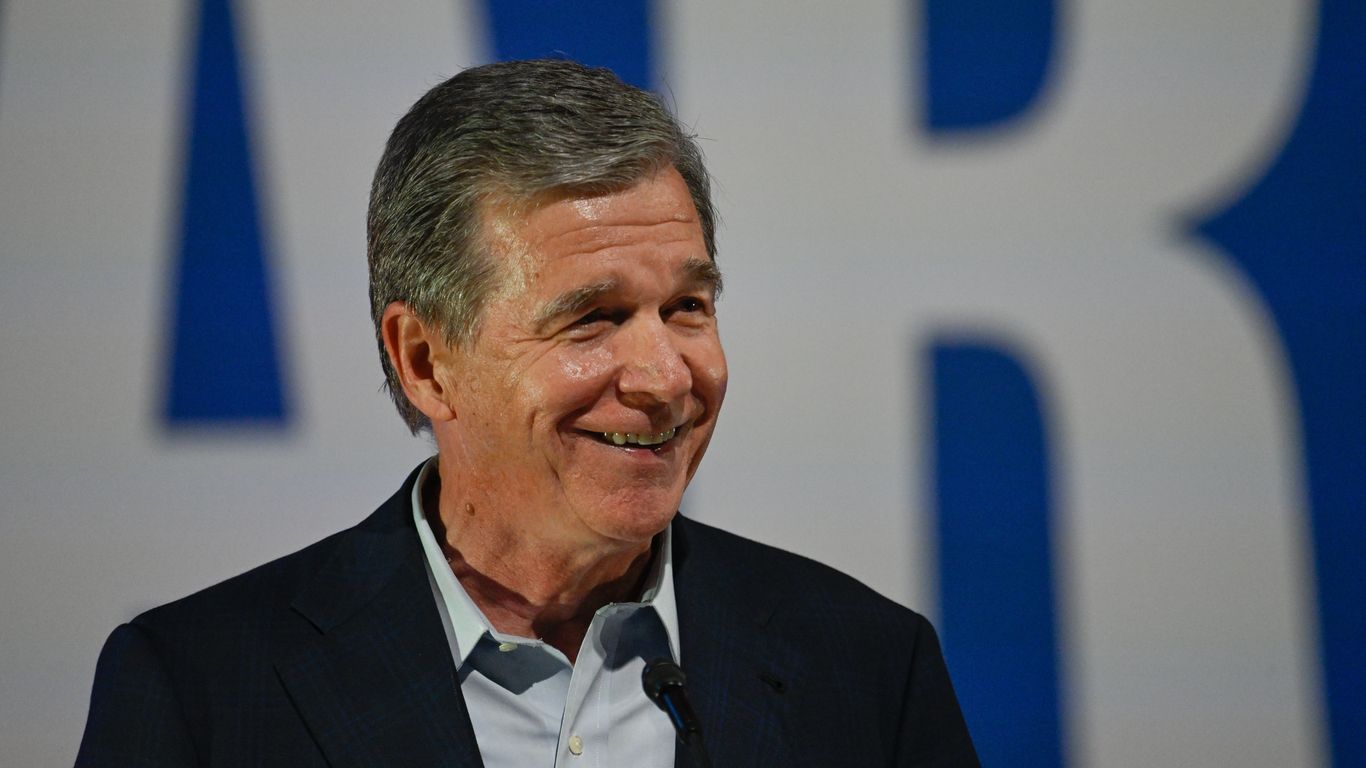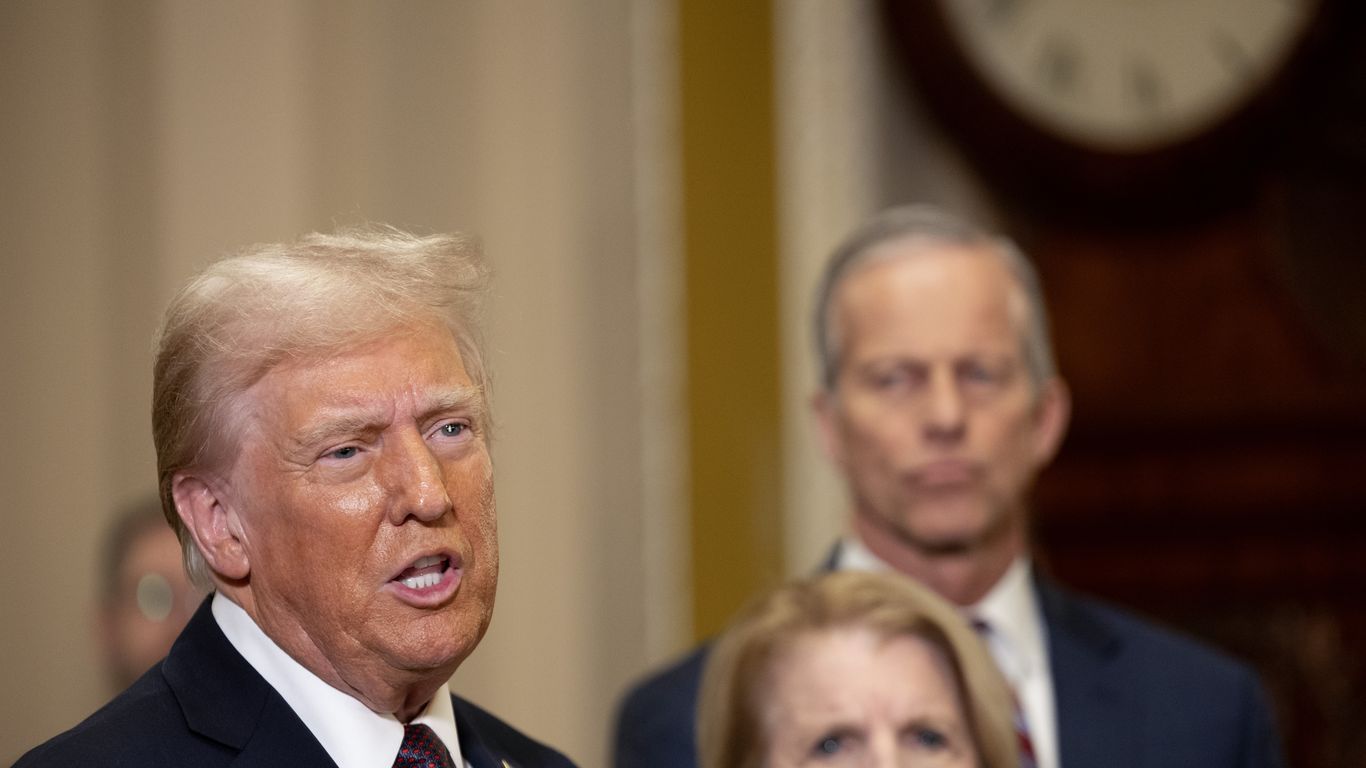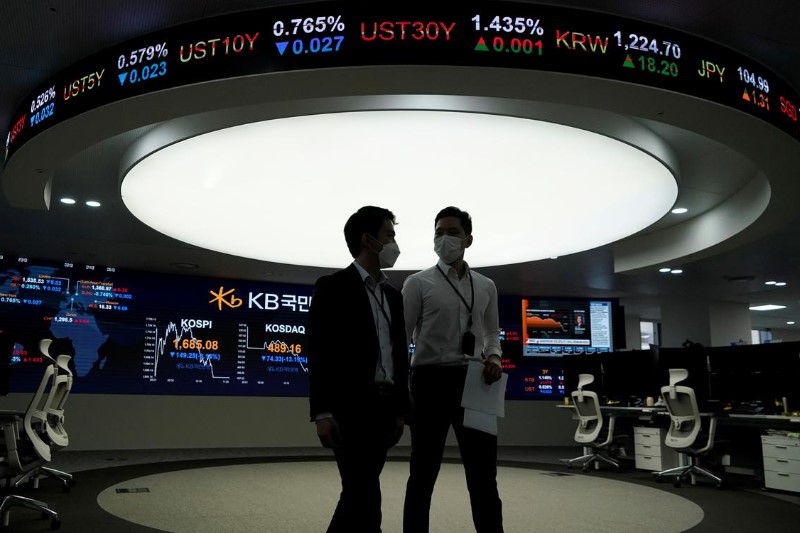The Impact of Politics on the Stock Market

Introduction
The stock market has been on a rollercoaster ride in recent months, but there may be a potential key to a new rally: the Democrats. According to Ned Davis strategists, political factors are playing a significant role in keeping certain investors pessimistic.
Background
Former President Biden's age and mental acuity have become a topic of concern for the next leaders in the Democratic party. This was further exacerbated by the release of audio from interviews that were published on Friday.
Current Scenario
The Medicaid cuts in the Republican bill have emerged as an early flashpoint for the 2026 elections. This has caused tension between the two parties, with Democrats pushing back against the proposed cuts. This could potentially affect the stock market as well, as any changes in healthcare policy could have a ripple effect on various industries.
Additionally, the recent wedding party of Jeff Bezos and Lauren Sánchez has also caught the attention of the media. According to sources, the couple and their star-studded guests danced until 4 a.m. This highlights the power and influence of the wealthy and how their actions and decisions can impact the stock market. Bezos, the founder of Amazon, is a major player in the tech industry and any changes in this sector could have a significant impact on the stock market.
With all these factors at play, it is evident that politics and the decisions made by political leaders can have a significant impact on the stock market. This is why many investors are closely watching the actions and policies of the Democratic party, as they could potentially be the key to a new stock market rally.
Conclusion
The stock market is always at the mercy of various external factors, and politics is no exception. With the Democrats as the last holdout bears, their decisions and actions could have a significant impact on the stock market's future. It is important for investors to keep a close eye on the political landscape and how it may potentially affect the stock market in the coming months and years.
About the People Mentioned
Joe Biden
Joseph Robinette Biden Jr., commonly known as Joe Biden, is the 46th President of the United States, serving from 2021 to 2025. Born on November 20, 1942, in Scranton, Pennsylvania, Biden moved to Delaware with his family in 1953. He graduated from the University of Delaware in 1965 and Syracuse University Law School in 1968. Before entering national politics, Biden served on the New Castle County Council and later became one of the youngest U.S. Senators at the age of 29, representing Delaware from 1973 to 2009. During his Senate career, Biden chaired the Senate Judiciary Committee and Foreign Relations Committee. He played a crucial role in drafting several significant pieces of legislation, including the Violence Against Women Act and the Violent Crime Control and Law Enforcement Act. Biden also oversaw several U.S. Supreme Court confirmation hearings. In 2008, he was chosen by Barack Obama as his vice presidential running mate, serving two terms as the 47th Vice President of the United States. In 2020, Biden won the presidential election, defeating incumbent President Donald Trump. As President, he focused on rebuilding America's international leadership and implementing policies to address economic recovery and social issues. Biden's presidency concluded on January 20, 2025, when Donald Trump returned to office. Recently, Biden announced that he had been diagnosed with Stage 4 prostate cancer. Despite his health challenges, Biden remains a figure of national interest, with ongoing discussions about his political legacy and influence. His dedication to public service and his efforts to expand opportunities for Americans have been central themes throughout his career.
About the Organizations Mentioned
Ned Davis strategists
Ned Davis Research (NDR) is a renowned global provider of independent investment research and solutions, founded in 1980 by Ned Davis. The organization is known for its comprehensive approach to market analysis, utilizing a weight-of-the-evidence methodology that combines fundamental, macroeconomic, and technical research to help investors make informed decisions[3][4]. ### History and Key Achievements Ned Davis, a seasoned investment strategist, started his career in the stock market over 50 years ago. He co-founded NDR with Ed Mendel, and the company quickly gained recognition for its objective and data-driven approach to market analysis[6]. One of NDR's most notable achievements was its timely advice to clients before the 1987 Black Monday crash, which significantly boosted the company's assets and reputation[1]. ### Current Status Today, NDR operates with a global presence, offering a wide range of services including quantitative macro research, investment solutions, and thematic opportunities[3]. The company has expanded beyond its Venice headquarters to include branches in Atlanta, Boston, San Francisco, and London, serving over 1,000 institutional clients worldwide[1]. In 2011, NDR was acquired by Euromoney for approximately $130 million, further solidifying its position in the financial sector[1]. ### Notable Aspects Ned Davis is celebrated for his strategic approach to investing, emphasizing the importance of adapting to market changes and avoiding major mistakes. He is the author of several books, including "Being Right or Making Money" and "The Triumph of Contrarian Investing"[2]. NDR's commitment to using technology to analyze vast amounts of data has been a key factor in its success, allowing it to provide unique insights not readily available elsewhere[1]. Overall, NDR's dedication to objective research and strategic investment advice has made it a respected voice in the financial community.
Democratic Party
## Overview of the Democratic Party The Democratic Party is the oldest continuing political party in the United States, with its roots tracing back to 1792 as the Democratic-Republican Party. Founded by Thomas Jefferson and James Madison, it initially advocated for a decentralized government and states' rights, opposing a strong central authority[1][2]. Over time, the party evolved, becoming more progressive and supportive of federal government intervention in social and economic affairs. ## History The modern Democratic Party was formally established in 1828, with Andrew Jackson's presidential campaign marking a significant turning point. Jackson's successful campaign expanded voting rights to all white men, regardless of land ownership, and further reduced federal power[3][6]. The party became deeply divided during the Civil War era, with Northern Democrats supporting limited slavery expansion and Southern Democrats advocating for its perpetuation[3][5]. Post-Civil War, the party became a stronghold for Southern whites who opposed Reconstruction[3]. ## Key Achievements The Democratic Party has played a pivotal role in shaping U.S. history: - **Civil Rights**: The party supported key civil rights legislation, including the Voting Rights Act and the Civil Rights Act of 1964. - **Social Programs**: Democrats have been instrumental in establishing and expanding social programs like Social Security, Medicare, and Medicaid. - **Economic Policies**: The party has often championed progressive economic policies, including labor rights and environmental protection. ## Current Status Today, the Democratic Party is a major force in U.S. politics, advocating for a strong federal government role in addressing social and economic issues. It emphasizes progressive policies on healthcare, climate change, and economic inequality[6]. ## Notable Aspects - **Symbolism**: The party's symbol, the donkey, originated from Andrew Jackson's opponents calling him a "jackass," which his supporters adopted as a mascot[6]. - **Diversity**: The party has become increasingly diverse, representing a wide range of socio-economic and
Republican Party
The **Republican Party**, also known as the **GOP (Grand Old Party)**, is one of the two major political parties in the United States, founded in 1854 primarily by anti-slavery activists opposing the Kansas-Nebraska Act and the expansion of slavery into U.S. territories[1][5]. It was formed from a coalition of former Whigs, Democrats, and Free Soil party members who shared opposition to slavery and a desire for a national political force promoting economic development and social order[2][5]. The party's early base included northern Protestants, businessmen, factory workers, professionals, and prosperous farmers. It strongly supported pro-business policies like the national banking system, the gold standard, railroads, and high tariffs[1][3]. Abraham Lincoln, the first Republican president elected in 1860, led the party through the Civil War, championing the abolition of slavery and the preservation of the Union. This solidified the GOP’s dominance in national politics for decades, especially in the North, while it remained weak in the South[1][5][6]. Historically, the Republican Party was instrumental in major social reforms, including the Emancipation Proclamation and the passage of the 13th, 14th, and 15th Amendments, which abolished slavery, guaranteed equal protection, and secured voting rights for African Americans, respectively[6]. The party also supported women's suffrage early on, backing the 19th Amendment[6]. In the 20th century, Republicans were associated with both conservative economic policies—favoring reduced taxes, limited government regulation, and individual economic freedom—and a strong national defense[7]. The party experienced ideological splits, notably in 1912 when Theodore Roosevelt led a progressive faction away from the conservative wing[1][5]. Today, the GOP continues to promote conservative social policies and states’ rights, opposing extensive federal intervention and advocating free-market principles[7]. For readers interested in business and technology,
Amazon
Amazon.com, Inc. is a leading American multinational technology company specializing in **e-commerce, cloud computing, digital streaming, online advertising, and artificial intelligence**. Founded in 1994 by Jeff Bezos in Bellevue, Washington, Amazon initially launched as an online bookstore but rapidly expanded into a vast online marketplace known as "The Everything Store," selling a wide array of products across numerous categories[1]. Today, it stands as the **world's largest online retailer and marketplace**. Amazon operates multiple key business segments: Amazon Marketplace for retail sales, Amazon Web Services (AWS) for cloud computing, and Amazon Prime for subscription services, all contributing substantial revenue streams and synergistic benefits[3]. AWS is a powerhouse in scalable cloud infrastructure, serving businesses globally, while Amazon Prime offers fast delivery, streaming video, music, and exclusive deals to millions of subscribers[1][3]. The company’s growth strategy focuses heavily on technological innovation, particularly in **artificial intelligence and robotics**. Its AI-powered products include Alexa, the voice assistant embedded in Echo devices. Amazon’s warehouses employ over 45,000 robots, reflecting its commitment to automation and efficiency in logistics[4]. Capital expenditures for 2025 are projected at $118 billion, emphasizing AI and cloud expansion[4]. Amazon’s notable acquisitions have broadened its market reach and diversified offerings. Key acquisitions include **Whole Foods Market (2017), MGM Studios (2022), Twitch, Ring, and IMDb**, which have enhanced its physical retail presence, media content, and smart home technology portfolio[1][3]. These moves have helped Amazon maintain market dominance with over $574 billion in annual revenue and a market capitalization exceeding $2 trillion[3]. Despite strong retail and advertising performance, Amazon faces challenges such as narrowing AWS margins and increased AI infrastructure competition. However, its Q2 2025 financials showed robust revenue growth, with net sales rising 9% to $155.7 billion, underscoring its resilience and adap


















